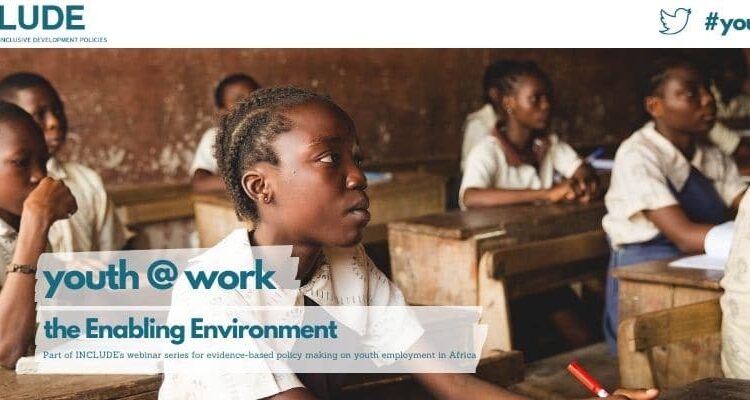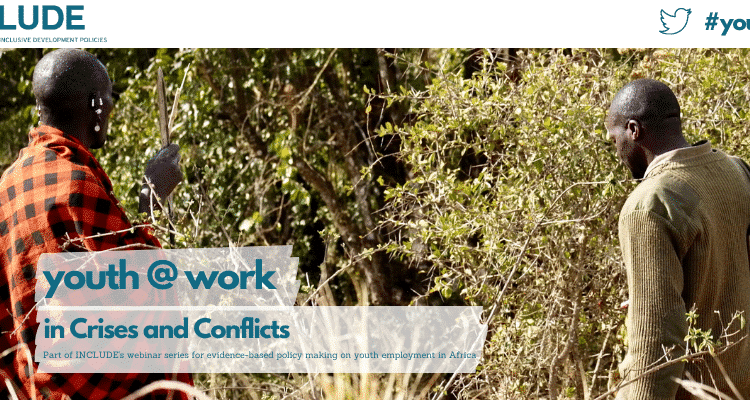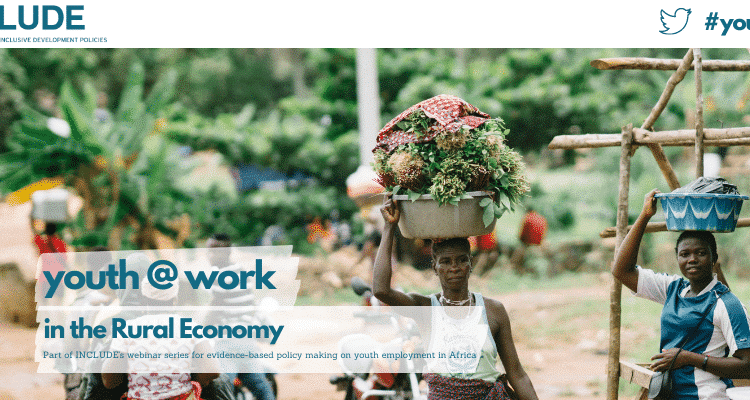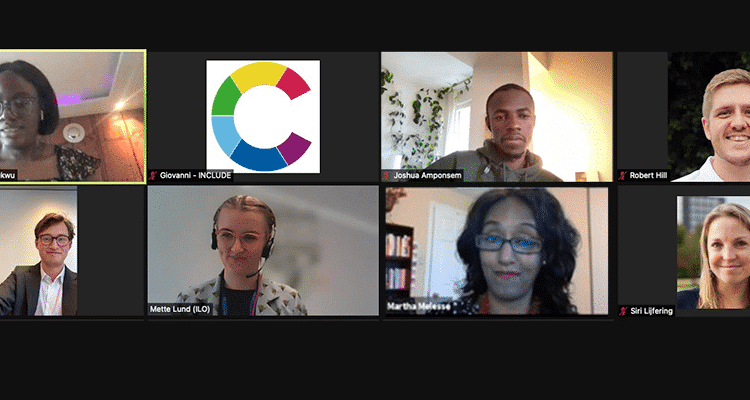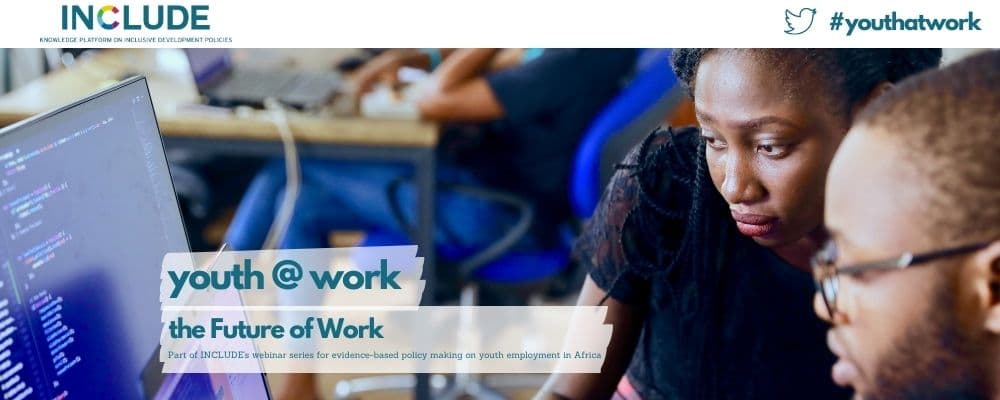
How can the Fourth Industrial Revolution support youth employment in Africa? This was the main question of the closing session of the Youth@Work webinar, hosted by INCLUDE, with the support of Canada’s International Development Research Centre (IDRC) and the International Labour Organization (ILO). During the Youth@Work webinar series, researchers, practitioners, policymakers and youth come together to share knowledge and good practices on youth employment in Africa. This article presents the key insights emerging from the online event.
A key trend in the world of work has been an acceleration of innovation and technological change. A group of these new technologies has been labelled as part of the Fourth Industrial Revolution (4IR) owing to their transformative potential, and because they build on the computing and digital technologies of the Third Industrial Revolution (3IR). It is widely agreed that these next-generation cyber-physical technologies will significantly change production, consumption, trade, the cost of goods and services, and living standards across the globe—more rapidly than previous industrial revolutions, owing to the scope and speed of innovation. And although adoption has been most rapid in the Global North, the 4IR technology wave has already begun washing up on Africa’s shores.
When it comes to youth employment in Africa the key question is: to what extent can the suite of new technologies known as the Fourth Industrial Revolution accelerate the creation of new wage jobs in expanding, higher-productivity sectors, leading to a decline in the share of people working informally, and to what extent would youth benefit?
Looking through a crystal ball
According to Louise Fox, senior fellow at the Brookings Institution, visiting professor at the University of California and author of the evidence synthesis paper (ESP) around the fourth industrial revolution and the future of work, predicting what the effects of the 4IR are is like ‘looking through a crystal ball’. Fox: ‘Every industrial revolution before has both destroyed and created jobs, but it is nearly impossible to predict exactly where jobs will be gained and how many jobs will be lost.’ We should therefore, according to Fox, avoid a ‘bean counting approach’ where we just count the numbers of jobs created versus those lost, but should instead look at how we can maximise the benefits of the 4IR for employment creation. According to Fox the outcomes of the 4IR will as such not depend so much on the development of technologies, but rather on the development of public policies and structural economic transformation that stimulate youth employment and decent work in Africa.
Co-author of the ESP Landry Signé, Managing Director and Professor at the Thunderbird School of Global Management and senior fellow at the Brookings Institution, adds that in order to reap the benefits the 4IR in Africa, it is crucial to address barriers and challenges to the adoption of digital technologies. The first being the digital divide. Significant gaps in physical and digital infrastructure in many African countries limit the accessibility to modern information and communications technologies. The high cost of internet data and unreliable and expensive electricity provision means that especially the most marginalised groups in society may be excluded from the potential benefits of the digital revolution. Left unaddressed, the 4IR might, as such, exacerbate rather than challenge inequalities in the region. In addition, as Sub-Saharan Africa is already dealing with a learning crisis in primary and secondary education, there is a real concern that there will be a significant skills gap when it comes to the future of work. The question in this regard is how to develop the necessary high level STEM- Science, technology, engineering, and mathematics- skills without neglecting the needs of most of the future labour force who will not even have enjoyed post-secondary education?
Crowdwork and the ‘uberization of work’
Niall O’higgins, Senior Research Specialist in the ILO’s Employment Analysis Unit, agrees with Fox and Signé that if left to its own devices, the digital economy is likely to benefit the more highly educated in Africa, leaving behind the millions of less-educated youths in Africa. In this regard, he pleads for a more inclusive approach, focussing not only on tertiary education and STEM skills as a panacea for improving the employability of Africa’s youth in the 4IR, but also addresses the lack of access to primary and secondary education to stimulate youth employment. As O’Higgins stresses: ‘Access to basic education cannot be leapfrogged as it underlies the basic issue of trying to encourage inclusive employment growth for youth in Africa.’
This will be particularly important when it comes to stimulating youth employment with regards to digital jobs such as internet-based crowdwork. Crowdwork, also known as crowd employment or crowdsourcing, is a form of employment that uses an online platform to provide specific services or products in exchange for payment. By matching clients and workers, crowdwork organises the outsourcing of tasks to a large pool of online workers rather than to a single employee. According to O’Higgins crowd work offers an attractive proposition to youth in Africa because the return on experience in terms of earning is generally higher than in other forms of employment as youth generally pick up the necessary skills faster than older crowdworkers.
Crowdwork could also open up job markets for previously marginalised groups. For example, people with disabilities that may have difficulty participating in the job market, might have better access to digital jobs. In addition, due to its flexible nature in terms of working hours, digital jobs might also be more accessible to women with care responsibilities and can as such help bridge the gender divide when it comes to youth employment. However, as O’Higgins warns, due to its uncertain nature crowd-work is often also precarious and therefore, when it comes to the 4IR and the future of work, special attention needs to be paid to the quality of work.
Hannah Dawson, Senior Researcher at the Southern Centre for Inequality Studies (SCIS) at the University of the Witwatersrand, agrees with Higgins that many digitalised jobs in the service sector are characterised by high levels of precarity. Presenting findings from her research into the impact of digital technologies on youth employment in South Africa, Dawson shows that there is a trend of the ‘uberisation of work’. With the emergence of digital platforms like Uber, a lot of workers are misclassified as independent contractors to bypass existing labour regulations and social protection. Like many other workers in the informal economy, platform workers are as such extremely vulnerable and often exploited; having to work long hours, for low wages without any form of social protection. Within these platforms, there is a growth of new and hybrid forms of workers’ associations, which may have the potential to shape the terms of digitalisation and the conditions of the future of work and as such present an interesting avenue for those working on youth employment in the digital economy.
When it comes to the impact of the 4IR on the future of work in Africa, the jury is as such according to Dawson still out on whether the digital economy will more widely entrench or justify the casualisation and informalisation of work or if it can be a catalyst to strengthening employment conditions and processes towards formalisation. According to Dawson, most policy debates on the 4IR, have tended to ignore the lived-realities of how work is experienced by youth now in the context of un- and underemployment, poverty and inequality. If we want to learn about the potential implications of the digital revolution it is crucial not only to look at the future but also focus on what is happening now in different countries. In this regard, it is important not to look just at Africa in general, but take into account the political, social and economic diversity of the global South and contextualise findings for a better understanding of what is needed to address key challenges for the future of work.
A policy perspective
Sharing experiences from practice, Kehinde Ayanleye, co-founder of Stutern – an organization connecting African millennials with technology skills and job placement- agrees with Dawson that youth employment in the context of the 4IR requires inclusive youth employment policies. To stimulate youth entrepreneurship there needs to be an enabling environment to accommodate and leverage digital innovations such as FinTech, that make it easier to transfer money internationally and as such enable digital jobs for youth in Africa, Ayanleye explains. Preparing for the future of work as such requires not only upskilling the youth, but also sensitising policy actors so they can recognise opportunities of the 4IR and act accordingly.
Reflecting on the future of work from a policy perspective, Mirjam Horstmeier and Tijmen Roosenboom, shared some of their experiences and insights working on these themes within the Dutch Ministry of Foreign Affairs (MoFA). According to Horstmeier, who is a senior advisor on professional education at the MoFA, it is important to first get the basics right when it comes to skills development for the future of work. Horstmeier: ‘We need to invest in primary and secondary education as a foundation for youth employment’. Basic skills such as learning to read and write, but also transferrable skills like problem-solving and creativity are, according to Horstmeier, key to stimulating the employability of youth in the future of work, and should therefore be on top of the policy agenda.
Concluding the session and reflecting on the Youth@Work webinar series, Roosenboom, Ambassador for Youth, Education and Work at the MoFA and promotor of Youth at Heart, stressed the need for progressive policy action to simulate youth employment in Africa. Roosenboom: ‘The balance between the positive and negative effects of the 4IR will depend on the policy choices we make. It is therefore key to ask young people what they want, not only in the context of digitalisation of work, but also in their broader search for employment, because they know best what they need to make it work.’
